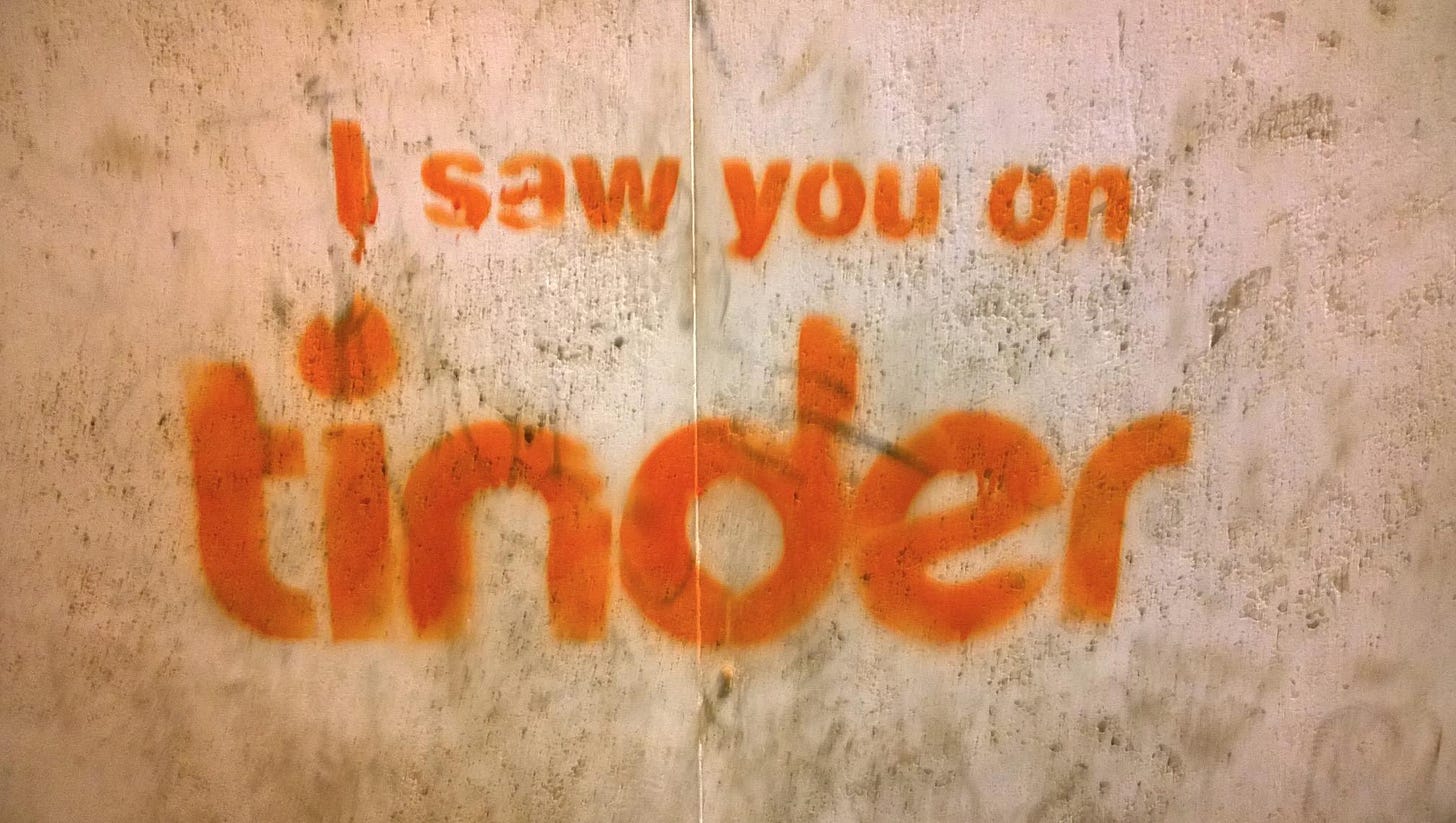Mind and Iron: What the Super Bowl and ScarJo Tell Us About Where Media Is Going
And can the machines help us find a better Valentine's Day date?
Hi and welcome back to another pungent episode of Mind and Iron. I'm Steven Zeitchik, veteran of The Washington Post and Los Angeles Times and lead auctioneer at this newsy market-call.
Every week we bring you the best in humanist tech news. Please consider supporting our independent mission.
What a day/week/century it's been for tech and AI, starting with the barrage on our consumer psyches during the Super Bowl telecast Sunday and continuing with the video Tuesday of deepfaked Jewish celebrities flipping off Kanye to a remixed Hava Nagila. We'll bring all that home for you.
Also, it's Valentine's Day on Friday, which means it's worth taking a quick peek at how all those algorithms are doing in finding us love. This one’s a happy story!
A quick housekeeping note that we'll be out next Thursday for Presidents Week, back at you strong the following Thursday.
First, the future-world quote of the week:
“They are very famous. They are the most famous Jewish [celebrities] in the world. I wish they would share it and say, 'We definitely agree with this video, we want to spread it all over.'”
— Guy Bar, Israeli AI entrepreneur, on why he used celeb images to condemn Kanye (and offering a new, potentially noble, use of deepfakes)
Let's get to the messy business of building the future.
IronSupplement
Everything you do — and don’t — need to know in future-world this week
All those SuperBowl AI ads have a more nefarious agenda; was Scarlett right to condemn her condemnation?; the real problem with dating apps
1. WORDS CANNOT EXPRESS THE CRAZY SPEED at which AI encroached in our mental airspace this week — from all sides, in every way.
It began on Sunday, when we saw Big Tech essentially take over the Super Bowl with its AI dreams. Most obviously came the commercials of companies like Google showing the cuddly side of the tech (proud dads! nervous boyfriends! earnest cheesemakers!) all meant to amnesiac us to the dangers. Then, in a softer but no less impactful tactic, we saw a slew of AI-centric content meant to show how these contrivances can co-exist with our human media, no muss, no fuss.
A two-minute Coca-Cola spot had people worried about AI, but then flashed back to the '70's when the previous generation worried about screens too, and hey look at how silly that turned out to be since we're still here (don't think about that one for more than three seconds). One of the adults who was once worried about said screens says of AI "I think we're gonna be alright," and if that wasn't enough to reassure you, a Coke was brandished to truly tell us the danger has passed.
The move was kind of dishonest, or worse, given that Coke was pretty thoroughly hectored for using AI in its big holiday commercial this year. The whole thing had the feel of a company first trying to get by with some cheap studio-produced holiday fluff instead of employing real people and animators — and then going out and spending some $15 million to tell everyone worried about it to take a chill pill and wash it down with a Coke. It's all enough to make you go out and buy a case of Pepsi. (If you really want your head to spin, watch this absurd video of AI reviewing the AI ad.)
And then to top all that off came the AI-ified young Jimmy Johnson walking around a football field and leading us through his playing and coaching days in a way that normalized such concocted videos versus more expensive human-driven documentary interviews and archival footage.
I wrote about just this topic for my employer The Hollywood Reporter so will direct you to read the full piece there. But suffice to say that the ads we saw low-key conditioned us to embrace these AI tech no less than that "1984" Apple ad once got us to think different or the 2000 dot-com ads got us to think online shopping. Only that unlike the 2000 ads, which were at least partly benign (the other part was writing the obituary for retail stores and cities), we're now fully penning the obituary for natural-media and human-driven effort.
Social backlash was strong to the Johnson segment in particular. But don't let that fool you. Every time one of these packages gets put together they become a little more normalized and we become a little less resistant; don't be surprised if by next Super Bowl we see a whole bunch more AI content, created by networks moving too quickly with too few resources to do otherwise. And fifteen more commercials telling us how AI helps us be better parents or partners as it outsources more and more of our thinking.
All fine if that's the choice we're making. But are we making it? Or sitting idly by as this synthetic stuff becomes the norm, while big media and tech companies cut their spending and their humans then tell us we're gonna be alright.
2. ON WEDNESDAY WE SAW SCARLETT JOHANSSON, ADAM SANDLER, MILA KUNIS, JAKE GYLLENHAAL Jerry Seinfeld, Lenny Kravitz and a slew of other Jewish celebrities appear to be protesting Kanye's anti-semitic rants by kitting out in white T-shirts with a star of David and a middle finger to the man who's been spewing anti-Semitic vitriol.
The T-shirts are, of course, a reference to the white t-shirts adorned with a swastika that Ye had been despicably selling on his Web site. A techno remix of Hava Nagila plays in the background of the celeb video as they move in confident slow-motion telling off the off-the-rails rapper.
Of course, the videos were synthetic — the celebrities never appeared in any of them. Instead they were unwittingly part of a quickly but still efficiently assembled montage in which they look a little larger than life but are still convincing enough to embed themselves in our consciousness as having done what the video represents them doing.
Johansson — no stranger to being non-consensually enrolled in AI campaigns with the whole Open AI voice debacle from last year — immediately sprang into action, saying that “I am a Jewish woman who has no tolerance for antisemitism or hate speech of any kind. But...we must call out the misuse of AI, no matter its messaging, or we risk losing a hold on reality.”
Essentially what we have is a situation in which the cause is good but the tool ignoble — an inversion from the deepfake norm in which a neutral tool is deployed for a bad cause.
But the truth is that I'm not so sure the offense here is so serious. Is it not a little like misattributing a condemnation of a terrorist attack — sure, it's inaccurate, but who's it harming? And what's the danger? if you really run hard you can say a normalization of deepfakes, but you might pull a muscle doing do. In fact if not for the stigma of AI you probably wouldn't give this a passing glance. Swap in an older medium — "Oh, the celebrity was playfully said to have given a quote condemning hate speech when they didn't” — and you get…not much.
Look, I get how seeing celebrities do things they didn't do is uncomfortable and a slippery slope. But in all our deepfake-skepticism we should be making room for the use of AI to make pointed political comments too. It was immediately clear in this case that the creators were making a kind of meta-political comment — an almost "well if you're not going to have some backbone to condemn this stuff, we'll do it for you" aimed at the celebrities.
And sure enough, Thursday brought confirmation of just that idea when the man behind the video, an Israeli AI entrepreneur named Guy Bar of a company called Elevaitor, told us exactly that's what he was trying to do — offer a political comment.
"They are very famous. They are the most famous Jewish [celebrities] in the world," he told the Jewish Chronicle. "They are very relevant to Kanye West’s world. In a perfect world, the real [people would be] doing [the video with] their voice. I wish they would share it and say, ‘We definitely agree with this video, we want to spread it all over.”
I have to say, I kind of agree with him. I realize the line between exploitative deepfakes and legitimate commentary is thin — sometimes separated by the distinction of "do I like what this is all being done for?" But there is a distinction. When you use a deepfake to pretend, say, Taylor Swift is endorsing Donald Trump, you're trying to trick people into doing something -- supporting or voting for Donald Trump. When you use a deepfake to comment on a celebrity's actions, you're trying to tweak the celebrity for something they did or didn't do. Which seems a lot less harmful— and potentially a lot more legal.
From the legal experts I’ve talked to about this, the purpose does matter. Or at least you can make a case that it should. We have exceptions for parody when it comes to fair use; it's not inconceivable that we ultimately carve out exemptions on deepfakes for legitimate political expression too. (Currently the patchwork of state laws primarily prohibit pornographic exploitation and election-interference, and while those definitions themselves can be ambiguous, they're halfway there in saying not all deepfakes are bad.)
Someone using the tool a la a video like this can say — with the proper disclosures of course — "look at what these celebrities aren't doing that they should be doing." We accept drawn caricatures; is this really that different? The only distinction I can think of is that video seems more credible than illustrations. But how long will that last?
Johansson closed her statement with a message we can all agree with.
"There is a 1000 foot wave coming regarding AI that several progressive countries, not including the United States, have responded to in a responsible manner," she wrote. "It is terrifying that the US government is paralyzed when it comes to passing legislation that protects all of its citizens against the imminent dangers of AI.” On that point, at least, let's listen to Her.
3. TECHNOLOGY HAS BEEN SOLVING FOR THE PROBLEM OF ROMANCELESSNESS AND PARTNER-DEFICIENCY for more than two decades now. And it's been working as well as that MBA-esque sentence.
For all the emergence of dating sites and eventually apps, first Match and eHarmony and Nerve and now Tinder and Bumble and Hinge (and really now specialized apps like Bristlr and Veggly and Kippo), we seem to have gotten absolutely nowhere. Dating apps are certainly big business — the Match Group that owns a lot of the current apps has a market cap of $8.5 billion. Has this actually resulted in a better way to find love or a partner? The divorce rate has dropped in the 15 years since these apps came on the scene (by about 25 percent) -- which sounds good until you realize that probably has a lot more to do with other factors than dating apps.
In fact a landmark Australian study a few years back found that people who used swipe-based dating apps "were found to have significantly higher rates of psychological distress, anxiety and depression" than those who don't. So something's not working.
Probably not helping: the apps make money by keeping you on the platform, so they have an incentive for you NOT to find the love of your life — just to keep you in a state of swiping suspended animation. (The commonly heard goal to "get off this app" is stated year after year.)
Fortunately people seem to be realizing this, and the use of apps is dropping; in England the ten biggest apps combined saw a 16 percent dip in 2024 compared to 2023. People are indeed getting off the apps -- not because they've found true love, but because they realize it's making them truly miserable.
But what comes next? Or, more specifically, does technology come up with a better way to match us up and keep us happy? Or does dating truly fade back into something more personal and in-person?
Finding a better way to date in the modern world won't be achieved in one post or Valentine's Day. But it's worth noting that some new tech-based solutions are coming in.
One potential way involves meeting in gaming and immersive worlds. The BBC ran a story this week about a couple that met in World of Warcraft and even got engaged in-world. Not my cup of tea and perhaps not yours, but it does signal that technology has a role to play — IF you're still going to make your own choices about where to spend your time and interact in the deep way these worlds allow instead of with the brainless swiping the dating apps encourage. As we all spend more time in these immersive realms in the years ahead, not the worst tack.
There's also those specialty platforms (Bristlr, Veggly and Kippo are for beard enthusiasts, vegans and gamers, respectively.) Hey, at the very least you're starting your swiping journey knowing you have one priority in common instead of just the airiness of hoping you’ll find “the one.” Marriages throughout human history have flourished in controlled spaces — two families that thought a fit right, two high-school sweethearts who could never imagine being apart. Internet dating has operated under the fallacy we should be expanding our circle endlessly. But perhaps we should be constricting it a little? These sites do that.
More fantastical ideas also abide. A new device called Ripple, for instance, uses tech to give you a boost if you're out in a public place trying to meet someone — it literally buzzes your shoulder when someone is looking at you. (Hey if nothing else it's a good icebreaker.)
And let's not forget that AI lurks around the corner — not to build into these swiping algorithms, which if that happens might just be programmed to keep us there and unsatisfied even more, but as a tool to help humans in the real world. AI matchmaking concierges has been an idea mocked by many, including me, but the idea of an in-person dating situation boosted by some AI isn't the worst notion. For instance, it can help a human matchmaker sift through an impossible pile and then they can make the human call whether it’s a good match.
Or the AI can give you a scan of two competing social events and inform which is more likely to contain people you'd vibe with — but then you still have to go and do the in-person vibing. Or some other use-case yet to be revealed.
Technology has a role to play in dating, and we'd be hurting ourselves if we didn't embrace that idea. But not nearly as much as the current culture of swiping ad infinitum is hurting us.
The Mind and Iron Totally Scientific Apocalypse Score
Every week we bring you the TSAS — the TOTALLY SCIENTIFIC APOCALYPSE SCORE (tm). It’s a barometer of the biggest future-world news of the week, from a sink-to-our-doom -5 or -6 to a life-is-great +5 or +6 the other way. This year started on kind of a good note. But it’s been rough since.
SUPER BOWL ADS NORMALIZE SYNTHETIC MEDIA: -3.0
A NOBLE USE CASE FOR DEEPFAKES MAY HAVE BEEN DISCOVERED: +2.5
PEOPLE ARE REALIZING THE DANGERS OF DATING APPS AND LOOKING FOR BETTER WAYS: +2.5







